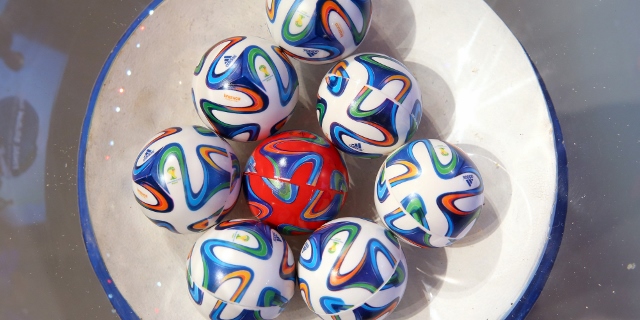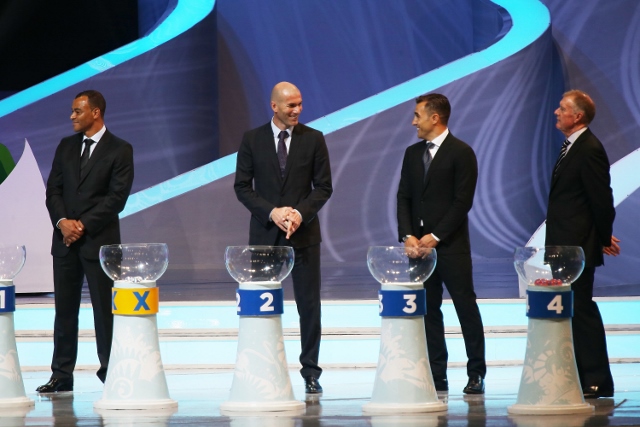Stephen Ludgate | Deputy Editor
When football fans across the world tuned in to watch the FIFA World Cup draw on December the 6th last year, many would have been surprised to see Switzerland among the eight seeded teams for the competition while teams like the Netherlands and Italy missed out. The draw, which took place in the Costa do Sauipe in the Brazilian state of Bahia saw the world’s top seven teams according to the FIFA World Rankings (in October 2013); Spain, Germany, Argentina, Colombia, Belgium, Uruguay and Switzerland along with the host nation, Brazil, seeded in the top pot. The advantage of being in this pot is that they could not be drawn with another seeded team in the group stages. But in order to understand how Switzerland found themselves in this pot while the Netherlands, Italy and England among other missed out on being among the seeds, we must look at how FIFA compile their world rankings.
Each team is awarded a score for each match they play based on the result (M), the importance of the match (I), the opponent (T), and the confederation from which the opponent is from (C). i.e., M x I x T x C.
(M): A team will receive 3 points for a win, 1 for a draw and 0 for a loss.
(I): A friendly is worth 1 point, a World Cup qualifier or confederation-level qualifier is worth 2.5, Confederation level or Confederations Cup match is worth 3 and FIFA World Cup match is worth 4.
(T): Points are awarded based on the strength of the opposition. The No. 1 ranked team is worth 200 points decreasing on sliding scale to the 150th ranked team who are worth 50 points and all teams below are also worth 50 points.
(C): Points are award based on the strength of the confederation where Europe/South America are worth 1, North and Central America, Caribbean 0.88, Asia/Africa 0.86 and Oceania 0.85.
So when the Netherlands beat Brazil in the quarter finals of the World Cup in South Africa, they would have earned the maximum number of points; 3 x 4 x 200 x 1 = 2,400.
But when compiling the rankings, FIFA have to compare all teams from different parts of the world, which is difficult because they all play hugely differing numbers of games. This means they have to take the average across all of the games a team has played and this is where the ranking can begin to become slightly skewed. The rankings include averages of games played in the last four years with the most importance placed on the last year.
So say for example that the Netherlands had played a friendly against a team outside the world’s top 150, for example Indonesia. The maximum number of points available for this game would be far lower than that for a World Cup game – 139.5 to be exact. No matter how comprehensively the Dutch won this game the amount of points they earned would not change. So if they had played this game in 2013, it would have had a huge impact on their ranking despite dominating their qualifying group. Unfortunately for Dutch fans this is exactly what happened in June of last year. Had they not played that game the Netherlands would have been one of the top seeds for the 2014 World Cup.
It was a similar story for Italy who played San Marino in a friendly on 31st May last year, a team that had only ever won one game in its history. Had this game not happened, Italy may well have been in the world’s top eight also. England’s draw with Ireland in 2013 also had a large impact on their ranking points, which will bring joy to many Irish football fans, and a stalemate with Brazil in the same month ruined their chances of being in the top pot for the World Cup draw. It’s also interesting to note that Switzerland played the fewest friendlies of any team in the world’s top twenty.
Similarly hosting a major event can cost countries a large number of ranking points as they are denied the chance to play competitive matches in the build up to the competition. In June of 2013 Brazil found themselves floundering at 22nd in the rankings until their Confederations Cup win elevated them back to 9th.
When the draw was made back in October, the BBC created a world rankings table excluding friendly matches which saw Italy, Brazil and the Netherlands jump into the top eight while Colombia, Uruguay and Switzerland fell out.
While international friendlies can create huge revenue for national associations’ in sponsorship and TV rights, when so much money is spent on their national team’s success perhaps more thought should be put into the friendlies they play and when they play them in order to maintain their ranking. The last team to win the World Cup who was not one of the eight seeded teams was Argentina in 1986 and that came courtesy of Diego Maradona and the ‘Hand of God.’









